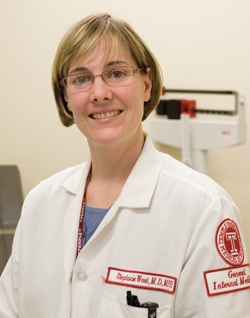Ignoring an epidemic
Examining weight loss tactics, doctor’s role in helping African-Americans lose weight
Being obese in a weight-obsessive society can leave you feeling invisible. But it’s even worse when the one ignoring you is your doctor — and that’s just what is happening inside clinics and hospitals every day.
Newly released research in the May issue of The Journal of Internal General Medicine reveals that patients think their physicians are not doing enough to help them manage their weight.
“Patients expect their doctors to initiate the discussion and not ignore their weight issues,” says lead researcher Stephanie Ward, M.D., M.P.H., assistant professor of medicine and public health at the School of Medicine. “They also feel doctors have the knowledge, but don’t take the time to give concrete advice on how to lose weight.”
Ward, a general internist at Temple University Hospital, conducted focus groups with 43 obese patients, all African Americans recruited through the general internal medicine practices at Temple. While obesity does not discriminate, national data shows it disproportionately affects African Americans, leading to severe health complications and even death. Patients in the study were asked a number of pre-established questions on how their primary care physicians address weight management.
“We were surprised by their desire for a degree of specific information which they wanted from their doctor,” said Ward. “Not whether low-carb or no-carb is the right diet, but rather they wanted their doctor to set long and short term goals and provide referrals to resources that would help them change behaviors they needed to change to reach a healthy weight.”
And behavioral change is what’s needed to assist patients in weight loss, added Ward. But it’s an area doctors feel ill-equipped to venture into. In fact, the United States Preventive Services Task Force (USPSTF) recommends that physicians screen all patients for overweight and obesity and then offer intensive counseling to those who need to lose weight. However, figures show such counseling occurs in less than 20 percent of primary care visits. Given that office visits are relatively short, Ward says there isn’t a lot of time to cover the basics and then get into a talk on weight management.
“Lots of times doctors focus on the disease without taking it a step further in how a patient’s weight might be influencing all of their chronic conditions.”
Ward adds those doctors who do “take it a step further” should be mindful of which techniques and terms work and which actually hinder weight loss. Study participants overwhelmingly disliked the word obese and insisted it should be used only in reference to zoo animals. A majority found doctors who were open and encouraging and acknowledged their efforts were beneficial, whereas doctors who ignored a patient’s weight or blamed all the patient’s ills on obesity were viewed more negatively. Scare tactics evoked a mixed reaction; some participants felt motivated, while others did not respond well to an ultimatum of “diet or die.”
“Overall, they feel doctors should know their patients well enough to know who would respond well to those tactics,” said Ward. “I hope physicians recognize that whatever method they choose, obese patients really do want to be counseled on weight management to understand how it’s impacting the medical conditions they have as well as their daily lives.”
The study was funded by a Department of Medicine Faculty Development Research Award from Temple University School of Medicine.
